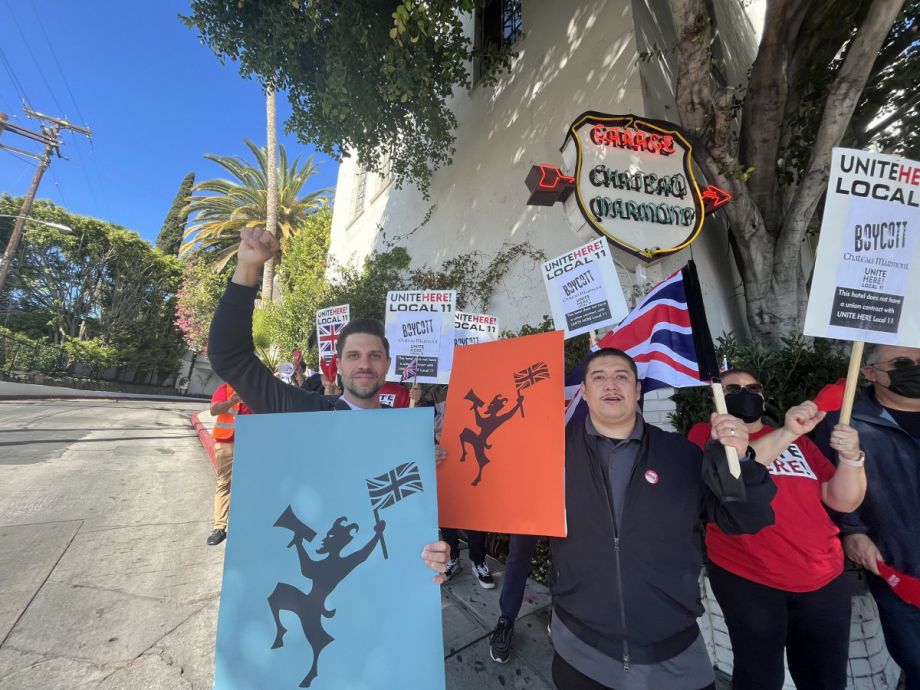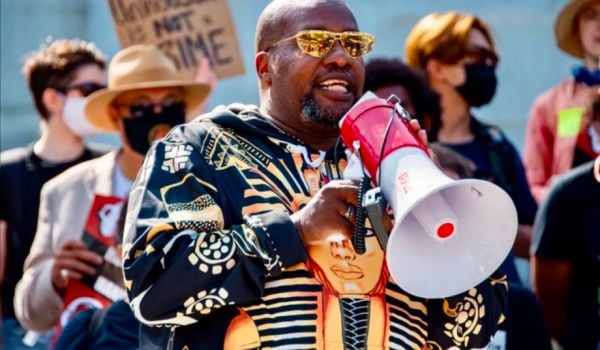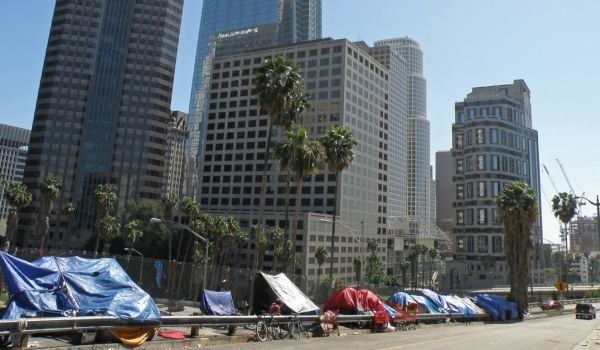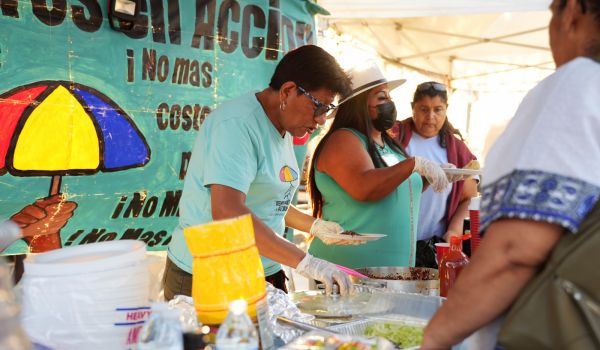This article was co-published by Prism and Next City as part of our Solutions for Economic Equity partnership, highlighting how low-income and marginalized BIPOC communities are cultivating, building, and seizing economic justice in cities across the U.S.
It’s a modern retelling of David and Goliath, set against one of Hollywood’s most iconic—and infamous—institutions: In late August, after years of reported abuse and corresponding attempts to organize, employees at the famed West Hollywood hotel Chateau Marmont, represented by trade organization Unite Here Local 11, reached an agreement with its management to allow them to unionize.
The Chateau has gained notoriety over its 93-year history, but its most raucous era arguably has been under the management of current owner André Balazs, described as a “sybarite” and “libertine,” who took over the property in 1990. By his own account, “The Chateau stands for all the fables of exotic Hollywood.”
Juxtaposed against the excesses of the rich and famous, which seem to have played out in every room of the legendary clubhouse, was the toxic and dangerous work environment described by hotel staff. Employees have alleged chronic racial discrimination, sexual harassment and assault, and neglectful—if not outright hostile—management, including from Balazs himself, who has been accused of “erratic, rageful and impulsive behavior directed at low-level staff as well as managers,” according to The Hollywood Reporter (THR) as well as groping staff while intoxicated.
“It’s like having an alcoholic, drug-addicted father,” one employee told THR. “But it’s your CEO.”
It appeared to be an open secret that the hotel would be as debaucherous as its owner, with the consent of Hollywood’s elite.
But the breaking point came when the country went into lockdown in March 2020, and Balazs let go of 248 workers without severance or health insurance. The Chateau now has 64 employees, 48 of whom had been with the hotel prior to the pandemic cuts.
Workers approached Unite Here Local 11, and together, they did what they’d been barred from doing for years: They organized.
“When the pandemic hit, we knew that the [hospitality] industry would attempt to change how hotels operate,” says Kurt Petersen, co-president of Unite Here Local 11. “This industry has tried to use [crises] as an opportunity to remake the workforce or change how business is done—almost always at the expense of the workers. And that’s definitely been the case here.”

Chateau Marmont in West Hollywood. (Photo by Tony Hisgett / CC BY 2.0)
In response, terminated workers, accompanied by religious leaders and community supporters, began protesting outside the hotel grounds. While hotel management refused to meet with them, the union accused them of unlawfully surveilling their demonstrations.
Then came the lawsuits. The Chateau faces three active civil suits, one for employment discrimination and the other two for racial discrimination, all of which were brought forth by Black former employees. The cases are still pending.
Thomasina Gross, a plaintiff in one of the lawsuits, is also a member of SAG-AFTRA, one of Hollywood’s heavy-hitting labor organizations supporting the workers. Karen Eyres, the head of the National Organization for Women’s Hollywood chapter, called for an industry-wide boycott of the hotel following news of Gross’ lawsuit in early 2021. “We are committed to standing with her and other Chateau workers in their struggle for justice,” Eyres told THR.
Other Hollywood unions like IATSE, Teamsters, Writers Guild of America – West, and Directors Guild of America also followed suit.
“Hollywood is such a union town, and the Chateau is such a Hollywood-centric property,” says Petersen. “I think it gave us an advantage in terms of having solidarity from Hollywood unions.”
What’s more, he said, many of these industry labor unions draw their membership for Unite Here’s base as well: “Our membership sort of bleeds into Hollywood. Folks come here to try to make it, to act or write or direct something, and in the meantime, they need to work and make money. Oftentimes, our industry tends to be where people land, so there’s a natural tie-in there.”
Unions here, Petersen says, will show up for their own.
Celebrities like Jane Fonda, Spike Lee, Issa Rae, Gabrielle Union, Samira Wiley, Robin Thede, Ashley Nicole Black and Alfonso Cuarón also joined in support of the workers.
While filming “Being the Ricardos” in April 2021, writer-director Aaron Sorkin immediately canceled the shoot at the hotel just hours before production began, after organizers informed the film crew of the picket line.
“I think that was a moment of real hope for all of us,” says Petersen. “We were as determined as ever.” And when “The Offer,” Paramount+’s miniseries on the making of “The Godfather,” pulled shooting from the site, workers knew they were making real headway.
Still, there were those who didn’t recognize the boycott: After this year’s Academy Awards, workers organized a picket line outside of Beyoncé and Jay-Z’s annual “Gold Party,” the couple’s post-Oscars bash, which was held at the hotel.
In May of last year, the California Democratic Party pulled its annual convention from the venue and encouraged Democrats not to do business with the Chateau “until such time when the hotel has demonstrated a commitment to respecting its workers’ years of service by rehiring them in accordance with their legal rights and to ensuring that all workers—regardless of their race, sex, or background—feel treated with dignity and respect.”
After a crescendo of bad press and industry ostracization, Balasz and management were finally worn down, and the workers’ campaign came to an end Aug. 25 with the announcement that they were finally forming their own union.
Unite Here is beginning negotiations with the hotel. “I will say that, since the announcement of the settlement, the company has been acting in good faith. They say they want to come in for justice and fairness, and we’re hopeful that they will meet those expectations,” says Petersen. “But having the power of a union is going to be useful in making sure that we have not just the economics but also the respect that these workers deserve.”
Asked why he thinks they won after coming up against such a formidable name in Hollywood, Petersen responds, “We’re relentless, and we will last one day longer than the employers. That’s what our members believe. That’s what these workers believed, and that’s what happened.”
But the tenacity of the workers themselves cannot be understated. In speaking with Next City, Petersen reiterates that the victory belongs to the workers, who chose to challenge their employer—an industry juggernaut—and sustain this fight through most of the pandemic, rather than seek employment elsewhere.
“We need to appreciate what they did not only with this campaign, but also with the fight for the right to return to work laws that eventually were passed in a number of cities as well as the state of California, which these workers led,” he says.
“I don’t think we can underscore enough how much courage that took, and in the middle of the worst health crisis in our country’s history. And because they did that, it’s not just them going back to work, but literally hundreds of thousands of workers.”
He hopes that not only will the workers serve as an inspiration to other workers, but that the Chateau can serve as a model for other hotels.
“Hopefully, other hotels will see us and understand that, when workers stand up for their rights, it’s in their interest to recognize those rights and allow workers to organize.”
This article is part of The Bottom Line, a series exploring scalable solutions for problems related to affordability, inclusive economic growth and access to capital. Click here to subscribe to our Bottom Line newsletter.

Frances Nguyen is a freelance writer, editor of the Women Under Siege section (which reports on gender-based and sexualized violence in conflict and other settings) at the Women's Media Center, and a member of the editorial team for Interruptr, an online space for women experts to disrupt discourse in traditionally male-dominated focus areas. She is currently working on a creative nonfiction portfolio on race, identity, and the American Dream.


















